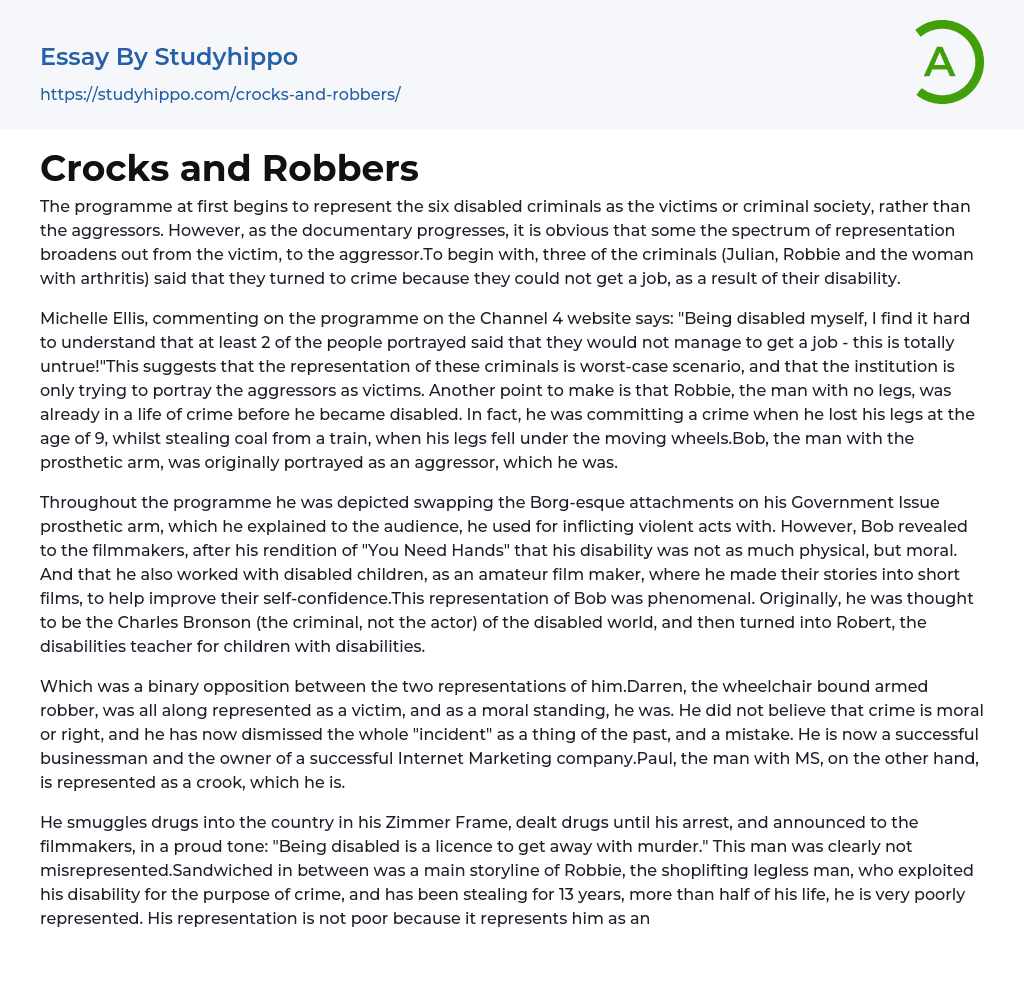Initially, the programme portrays the six disabled criminals as society's victims rather than its aggressors. However, the documentary's later stages demonstrate that the spectrum of representation moves beyond victimhood to include aggression. At first, Julian, Robbie, and the female criminal with arthritis blamed their disability for their turn to crime, claiming they were unable to secure employment opportunities.
Michelle Ellis, who identifies as disabled herself, disagrees with the portrayal of at least two criminals in the Channel 4 programme who claimed they wouldn't be able to find work due to their disabilities. She believes this is untrue and that the show is presenting the most extreme cases while trying to depict the offenders as victims. Another point to note is that Robbie, who has no legs, was already involved in criminal activity when he l
...ost them at the age of 9 while stealing coal from a train. Bob, who has a prosthetic arm, was initially shown as an aggressor, which is accurate.
Throughout the programme, Bob was shown changing the attachments on his Government Issue prosthetic arm, which he admitted to using for violent purposes. However, he later revealed to the audience that his disability was more moral than physical. In addition to this, Bob also worked as an amateur filmmaker with disabled children, creating short films to boost their confidence. This portrayal of Bob was truly remarkable as he went from being viewed as the disabled Charles Bronson to becoming Robert, the inspiring teacher of disabled children.
There was a binary opposition between the portrayal of two individuals. Darren, who was an armed robber in a wheelchair, was depicted as a victim and a moral individual.
He held the belief that crime was immoral and incorrect, and has since moved on from the "incident," regarding it as a past mistake. Darren is now a thriving entrepreneur and owns an accomplished Internet Marketing business. Whereas, Paul, with MS, is portrayed as a criminal, which he genuinely is.
The man who smuggles drugs into the country using his Zimmer Frame claimed he could get away with murder because of his disability. He dealt drugs until his arrest and was accurately portrayed in the film. Sandwiched between this storyline is the tale of Robbie, a legless man who has been shoplifting for over 13 years. He has poorly represented himself by using his disability to commit crimes. Though he is portrayed as an aggressor, the program fails to mention that he is responsible for his handicap and his criminal lifestyle. Overall, the program is inaccurate due to its lack of structure.
During filming, Darren and Bob were both shown as aggressive, but they went through significant changes afterwards. Julian was portrayed as a victim towards the end of the film because his criminal actions caused him to lose his family. However, it's important to remember that this was ultimately a result of his own behavior and not just victimization. Meanwhile, Robbie's character deserves further exploration in another program because despite lacking remorse for habitual offenses and blaming their self-inflicted disability for a life of crime that predated it, their motivations were often circumstantial due to their lack of education and frequently served as cover-ups for engaging in criminal activities simply because they "felt like it."
Overall, Channel 4 and director/producer Norman Hull should reconsider
how they portray victims and aggressors. They need to accurately represent victims as victims and aggressors as aggressors as there is confusion in the representation of these roles. Disabled individuals were portrayed as both aggressors and victims, with the exception of Julian, Robbie, Darren, and the woman committing housing benefit fraud. However, the majority were portrayed in the wrong way.
- Culture essays
- Social Control essays
- Citizenship essays
- Social Justice essays
- Caste System essays
- Social Responsibility essays
- Socialization essays
- Deviance essays
- Modern Society essays
- Popularity essays
- Civil Society essays
- Community essays
- Female essays
- Filipino People essays
- Igbo People essays
- Indigenous Australians essays
- Indigenous Peoples essays
- Minority Group essays
- Social Institution essays
- Men essays
- The nation essays
- Middle Class essays
- Social Norms essays
- Discourse Community essays
- Popular Culture essays
- Car Culture essays
- American Culture essays
- Mormon essays
- Indian Culture essays
- Mexican Culture essays
- Pop Culture essays
- Cultural Differences essays
- Culture Shock essays
- Different Cultures essays
- Agreement essays
- Business Law essays
- Common Law essays
- Community Policing essays
- Constitution essays
- Consumer Protection essays
- Contract essays
- Contract Law essays
- Copyright Infringement essays
- Court essays
- Crime essays
- Criminal Law essays
- Employment Law essays
- Family Law essays
- Injustice essays
- Judge essays




